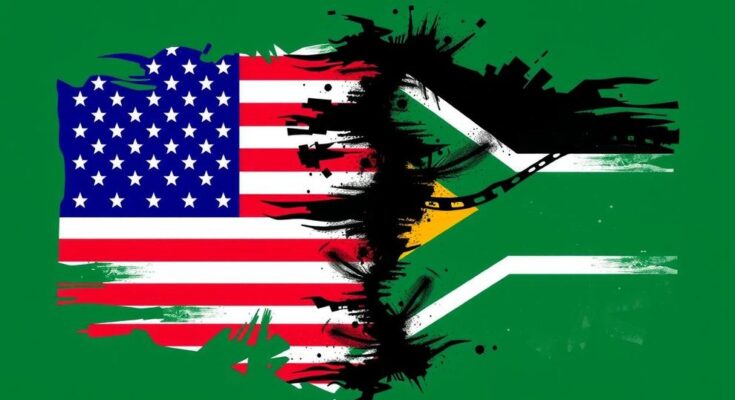The Trump administration has expelled South African Ambassador Ebrahim Rasool, citing anti-white and anti-American biases. This followed sanctions against South Africa and criticism of its policies towards white Afrikaner farmers. Tensions have risen due to South Africa’s support for Palestine and historic ties to Russia, complicating U.S. diplomatic relations despite a desire for cooperation from South Africa’s government.
The Trump administration has recently expelled the South African ambassador, Ebrahim Rasool, under claims of anti-white and anti-American sentiments. Secretary of State Marco Rubio declared that Rasool was “no longer welcome in our great country,” labeling him as a race-baiting politician. This expulsion follows Trump’s executive order that eliminated all funding to South Africa, criticizing its government for advocating policies perceived as anti-white while supporting groups like Hamas and Iran.
President Trump has previously accused the South African government of rights violations against white Afrikaner farmers due to a proposed expropriation law. However, the South African government has denied these accusations, asserting that no land has been seized and attributing the U.S. criticism to misinformation. Experts in South Africa have challenged claims of targeting white farmers, stating that farmers from all racial backgrounds face violent home invasions due to the country’s high crime rates.
The land issue remains contentious in South Africa, where a small white minority still controls a significant portion of arable land more than three decades after the end of apartheid. South African authorities have articulated that their land reform aims to rectify historical disparities without serving as a tool for confiscation. Despite Trump’s assurance of refugee status and expedited citizenship for Afrikaner farmers, many prefer to remain in South Africa.
In further sanctions, Trump referenced South Africa’s support for Palestine at the United Nations, accusing it of fostering anti-American sentiments in favor of Hamas and countries like Iran and China. The country’s longstanding advocacy for the Palestinian cause, conceived during Nelson Mandela’s presidency, generates tension in U.S.-South Africa relations. Rasool is part of a Muslim community in South Africa supportive of Palestine, while the Breitbart report connecting him to Hamas reflects a polarizing perspective.
The administration’s criticism extended to South Africa’s presidency of the G20, leading Rubio to boycott a foreign ministers meeting over the nation’s chosen themes of “solidarity, equality, and sustainability.” Rubio dismissed these as mere diversity and climate initiatives, refusing to invest taxpayer resources in attendance. Despite these diplomatic strains, South African President Cyril Ramaphosa expressed a desire to rebuild relations with the U.S., asserting commitment to mutual benefit and collaboration.
Long-standing tensions exist, as exemplified by recent accusations from the Biden administration implicating South Africa in support of Russia amid the Ukraine conflict. While Ramaphosa has shown a willingness to engage with the Trump administration, his political party has recently invited the Iranian ambassador to its ranks, which complicates diplomatic efforts.
The Trump administration’s actions against South Africa—including the expulsion of Ambassador Rasool and critical sanctions—reflect ongoing tensions rooted in accusations of anti-white policies and foreign alliances with adversarial states. These diplomatic frictions, alongside historical complexities regarding land ownership and racial politics, underscore the challenges facing U.S.-South Africa relations. Ramaphosa’s government, despite expressing a desire to mend ties, navigates a landscape peppered with competing narratives and geopolitical influences.
Original Source: abcnews.go.com




